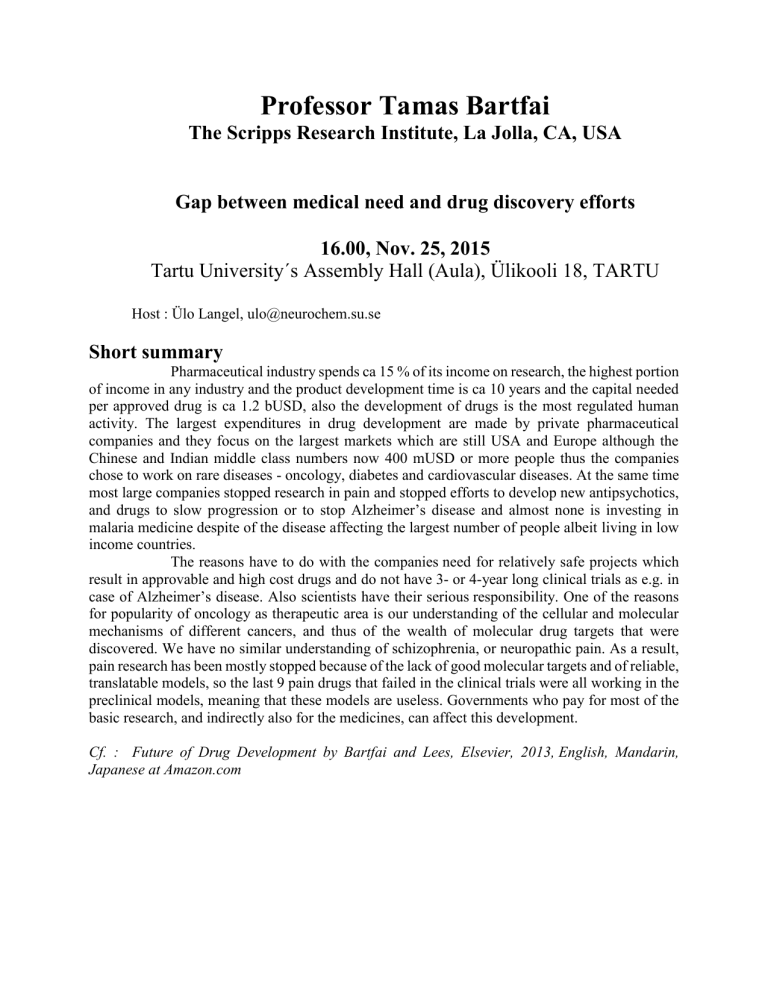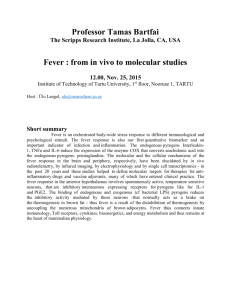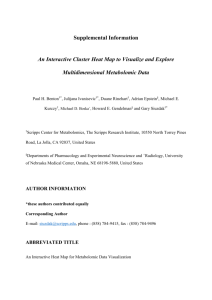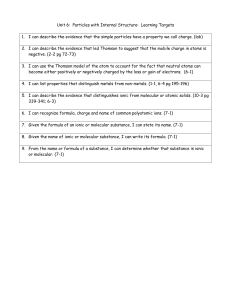Professor Tamas Bartfai The Scripps Research Institute, La Jolla, CA

Professor Tamas Bartfai
The Scripps Research Institute, La Jolla, CA, USA
Gap between medical need and drug discovery efforts
16.00, Nov. 25, 2015
Tartu University´s Assembly Hall (Aula), Ülikooli 18, TARTU
Host : Ülo Langel, ulo@neurochem.su.se
Short summary
Pharmaceutical industry spends ca 15 % of its income on research, the highest portion of income in any industry and the product development time is ca 10 years and the capital needed per approved drug is ca 1.2 bUSD, also the development of drugs is the most regulated human activity. The largest expenditures in drug development are made by private pharmaceutical companies and they focus on the largest markets which are still USA and Europe although the
Chinese and Indian middle class numbers now 400 mUSD or more people thus the companies chose to work on rare diseases - oncology, diabetes and cardiovascular diseases. At the same time most large companies stopped research in pain and stopped efforts to develop new antipsychotics, and drugs to slow progression or to stop Alzheimer’s disease and almost none is investing in malaria medicine despite of the disease affecting the largest number of people albeit living in low income countries.
The reasons have to do with the companies need for relatively safe projects which result in approvable and high cost drugs and do not have 3- or 4-year long clinical trials as e.g. in case of Alzheimer’s disease. Also scientists have their serious responsibility. One of the reasons for popularity of oncology as therapeutic area is our understanding of the cellular and molecular mechanisms of different cancers, and thus of the wealth of molecular drug targets that were discovered. We have no similar understanding of schizophrenia, or neuropathic pain. As a result, pain research has been mostly stopped because of the lack of good molecular targets and of reliable, translatable models, so the last 9 pain drugs that failed in the clinical trials were all working in the preclinical models, meaning that these models are useless. Governments who pay for most of the basic research, and indirectly also for the medicines, can affect this development.
Cf. : Future of Drug Development by Bartfai and Lees, Elsevier, 2013, English, Mandarin,
Japanese at Amazon.com
Tamas Bartfai, Ph D, professor
Department of Chemical Physiology, The Scripps Research Institute, La Jolla, CA
Professor of Drug Discovery, Oxford University, (Vis)
Adjunct Professor, Department of Pharmacology, University of Pennsylvania, Philadelphia , PA
Adjunct Professor Department of Neurochemistry, University of Stockholm
Research Focus
Professor Tamas Bartfai, Ph.D., focuses on two main research areas: 1) the roles of neuropeptide galanin in depression, anxiety, and seizures; and 2) fever, cytokine action in the brain and thermoregulation. The neuropeptide galanin has been found to influence several physiological processes such as cognition and memory, and regulation of mood. This is achieved at three galanin receptor subtypes that control the release of various neurotransmitters and hormones (e.g., acetylcholine, noradrenaline, glutamate, dopamine, insulin, growth hormone, prolactin).
Despite being among the most common pathophysiological signs of disease, we know little about fever. By studying the actions of fever producing substances, pyrogens in the brain, we are learning about fever, an adaptive stress response to microbial infection and to psychological stress. The center of the fever response is the warm sensitive and pyrogen sensitive neuron that is being characterized in great molecular detail; providing insights into how temperature regulation, metabolic rate and aging are correlated. There is a strong emphasis on the translational aspects of the research. Dr Bartfai has been involved in industry and academia in the development of several drugs that are in clinical use and he brings this angle of investigation to each experiment in the laboratory and the department.
Education
Ph.D., Biochemistry, Stockholm University, 1973
B.S., Physics and Chemistry, Eötvös Loránd University, Budapest, Hungary, 1971
Professional Experience
1986-1995 Neurochemistry (Chair), University of Stockholm, Stockholm, Sweden
1999-2003 Department of Biochemistry, The Karolinska Institute, Stockholm, Sweden
2000-2012 Professor, Molecular and Integrative Neurosciences Department, The Scripps Research
Institute
2006-2011 Chair, Molecular and Integrative Neurosciences Department, The Scripps Research
Institute
2011 Professor of Drug Discovery, Department of Pharmacology, University of Oxford, UK
2012 Professor, Department of Chemical Physiology, The Scripps Research Institute
Adjunct professorships: University of Pennsylvania, Philadelphia, PA; the Rockefeller University,
New York, NY
Industry:
1995-2000 Hoffmann-La Roche, Basel, Switzerland, Sr. VP, Head of Neurology and Psychiatry
Drug Discovery
2002-2008 Advisor Novartis, Neuroscience
2009 Advisor Pfizer Neuroscience, Metabolic Disease area
2008-2010 Head of SAB, Pfizer Incubator
Awards & Professional Activities
Eotvos Medal 1966, Budapest, Hungary; Swedberg Prize 1985, Royal Swedish Academy;
Ericsson Prize 1996 Royal Swedish Academy (shared);Ellison Medical Foundation Senior
Scholar Award 2002; Member, Hungarian Academy of Sciences; Member, Academia Europaea;
Member, Society for Neuroscience; Member, Cytokine Society; Member, Scientific Advisory
Board, The Blanchette Rockefeller Neurosciences Institute
Editorial Boards: Nature, Molecular Pharmacology
Editor-in-chief: Drug Discovery Mechanisms











